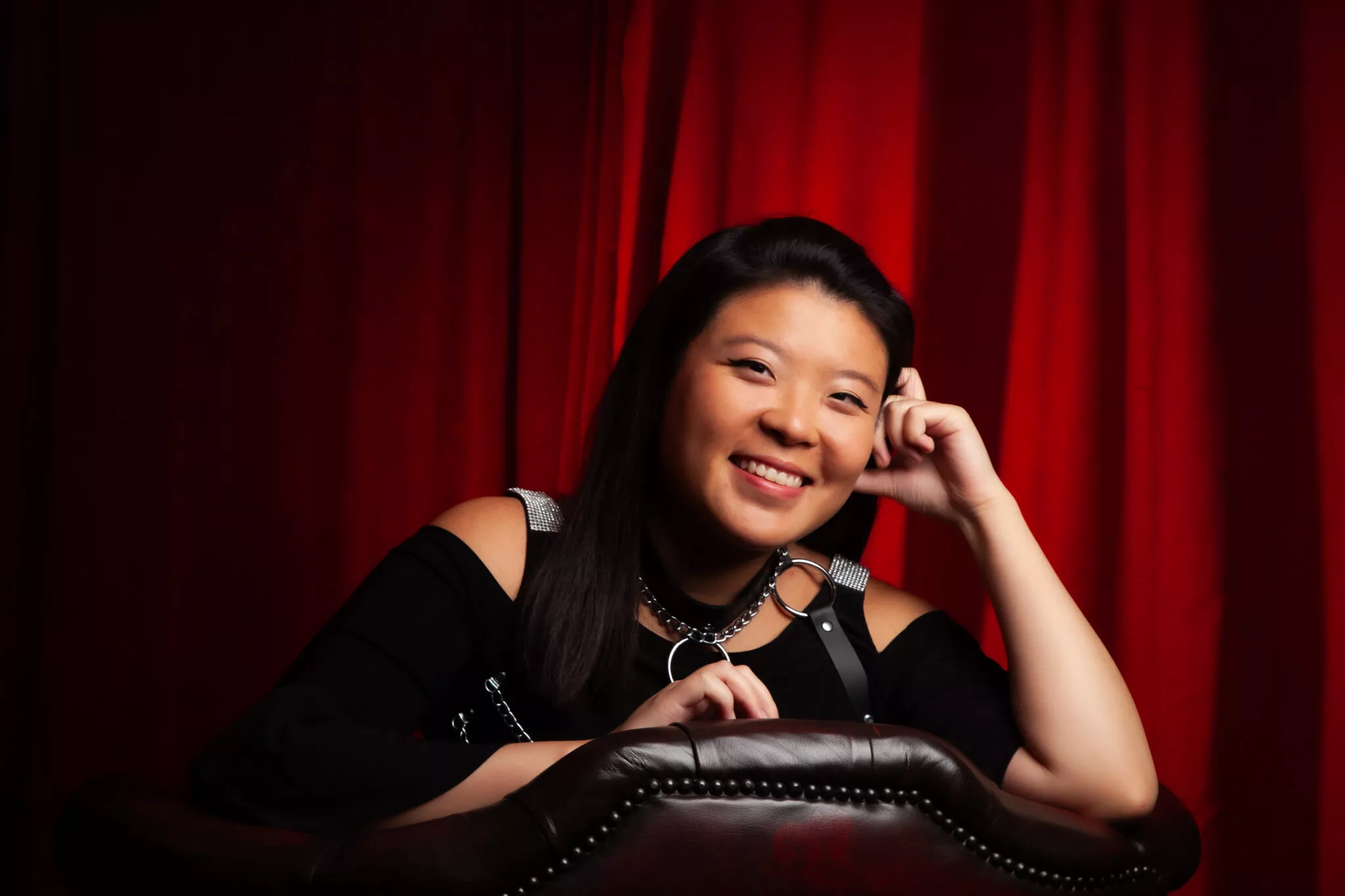Non-monogamous queers, this one’s for you! This week, Lorrae is joined by polyamory educator and queer advocate Leanne Yau, who discusses the intersection of polyamory, queerness, and neurodivergence through her social media project Poly Philia.
Leanne and Lorrae don’t shy away from tough topics in non-monogamy: cheating in polyamory (yes, it’s possible), effectively communicating and setting boundaries within multiple relationships, balancing your autonomy and needs within the context of relationships, and much, much more!
They share a laugh about the missteps in their first attempts at exploring polyamory, remind us that jealousy within any relationship is totally natural, and share some truly incredible wisdom about doing the inner work in order to be a good partner – in a conversation that even monogamous couples can learn from.
The two coaches inspire us to take stock of not only our relationships with our partners, but of the most important one of all – the one with ourselves.

Discovering Non-Monogamy and Infidelity in Polyamory
Lorrae: You share that you’ve been actively non-monogamous since you were 17. I’m curious how you knew that you were a poly and what that journey really looked like for you in the beginning.
Leanne: Yeah, so I’m 25 now and I’ve been non-monogamous since I was 17.
I was in one monogamous relationship before that, when I was 16, that lasted for about a year. Looking back at that relationship, I don’t really think that even that was particularly monogamous. I feel like a lot of polyamorous people feel this way, those who see it as an orientation, they look back at their past with their monogamous relationships and they’ll identify things that they thought at the time or believed at the time that weren’t quite in line with how most other monogamous people thought about their relationships or interacted within their relationships.
For me, it was while I was in that monogamous relationship, while we were exclusive, my partner at the time was a theater person and he got cast in a play where he essentially had to kiss another girl on stage. Everyone in my high school was like, “Oh my God, I could never do that. I could never watch my partner kiss someone else on stage, how do you feel about it, Leanne?” And 16 year old me was like, “I’m really jazzed for this actually. I think it’s gonna be great.”
I then tried to make friends with the girl who he was going to kiss on stage. I was trying to create this kinship with her that she thought was very, very strange. That was just me fumbling, trying to figure out why I was so into this idea of being friends with someone who my partner was going to be spending a lot of time with and being somewhat intimate with, even though it was obviously in a theater context.
That monogamous relationship ended up shaping quite a lot of how I view relationships generally as most people’s first relationships do.
That partner actually ended up cheating on me, and that was what partly ended our relationship. And I want to say at this point, because I think a lot of people are going to misinterpret me and think like, “Oh, this person’s polyamorous because she doesn’t want to be cheated on again,” or “This person’s polyamorous because she can’t stop cheating,” or “She doesn’t think her partner can stop cheating.” No.
So what the cheating experience taught me was two things. Firstly, that your partner can’t meet all of your needs in a relationship. My partner was bisexual at the time, and I didn’t realize I was bisexual either.
When he explained to me that he’d slept with a guy, I was like, “Why didn’t you just ask me about it?” I was obviously super upset, but I was also like, you could have avoided all of this mess, and you didn’t have to hide from me and do all of this stuff. If you want to explore that part of your sexuality, of course, go ahead.
I think he was kind of upset because he didn’t expect me to have that reaction. Obviously I was still going through the betrayal of trust and feeling really violated, as most people do with infidelity. But I was more mad about the fact that this whole situation could have been avoided if we just communicated with each other and if he trusted me about his sexuality and with this information than the idea of him sleeping with someone else. I actually didn’t give a f*ck about that.
That whole experience taught me that your partner can’t meet all of your needs and it’s very healthy for them to explore desires outside of the relationship, as long as it’s all agreed on and above board. And secondly, that I cared a lot more about communication and trust in my relationship than it being exclusive.
It didn’t really seem very appealing to me to have sex or date the same person for the rest of my life. I found that very limiting. To some extent that influenced my desire to open up my next relationship. We were monogamous for a short period of time, but even then we were talking about other people and being very open about desire for other people.
Then we went long distance and it was at that point that both of us mutually decided that opening up our relationship would be a good idea because we didn’t want to cheat on each other, but also we won’t be seeing each other a ton, so there’ll be needs that will go unmet and we don’t want to resent each other for that. We don’t want to break up just because we have those needs, so why don’t we stay together and open this up?
It was a practical, logical decision that just made so much sense to us at the time. And thinking about it in theory is different from how it went down in practice. He got really jealous about me being with other guys so that fell apart, but I was hooked.
I thought, there have got to be other people out there who feel the same way that I do. Since then, I’ve never looked back.


Lorrae: So much of that resonates with my own story because I also had this feeling that monogamy wasn’t working for me and I couldn’t really pinpoint why. I agree that it feels like an orientation for me because monogamy just felt like it wasn’t fitting, and it wasn’t that I wanted to go sleep with a bunch of people or that I was afraid that my partner was cheating. It was coming back to this thing of it didn’t feel like one person could meet all of my needs.
I so desperately wanted one person because of the monogamous scripts that were given to meet all those needs of affection and communication and connection and sexuality and being your best friend and being the person you run a household with. And that was so much pressure. It’s like you can’t do all the things all the time.
When I started to explore polyamory, it opened up my world so much more where it was like some people I enjoy going to concerts with and others restaurants and others staying in for a movie and we didn’t all need to be all the things all the time.
It took the pressure off me as well to try to feel like I had to fit into all these boxes and jump through all of these hoops to be everything for one person. It gave me such a sigh of relief that now when I think about my partner having an unmet need, it feels like, “Well, they can go meet somebody else and fill that need. I don’t have to change myself to try to conform to meet that and then fear if I don’t, that we’re going to break up.”
Leanne: And to be honest, it’s not even so much about meeting needs. Even if I did find someone who hypothetically did check all my boxes, why would I limit myself and why would I limit them? It’s more about having the freedom, having the option, and having that flexibility to customize your relationships and whatever, that appeals to me rather than needing multiple partners to do XYZ.
No, I want the freedom, I want the option, I want the autonomy, and I want the same to be granted to my partner.
Lorrae: I feel the same way because I just really enjoy the diversity of people, like people with diverse interests and ideas. And I like this whole idea of it being a community thing. The nuclear family doesn’t feel like it always works necessarily, and then we can just expand into these broader communities.
So for me, it is also so much about my own agency and autonomy and independence. And even if I’m choosing not to be with anyone, that I just have that option if it were to arise, just feels really freeing.
And I love that you mention infidelity too, because I’ve been cheated on in poly-open contexts and people are like, “How is that even possible if you’re open?” And like you said, it’s about the trust and the openness and the honesty that is the real infidelity. Cause I was like, “Why didn’t you just tell me? We could have talked about this and it would have been fine.” And that feels like such a betrayal.
Leanne: It’s so complex because there can be so many different reasons why something like that happens. Sometimes it’s an unmet need situation. Sometimes it’s a communication breakdown. Sometimes it’s purely a misunderstanding. Sometimes it’s someone discovering a boundary they didn’t know they had.
It’s so nuanced, especially in polyamory when you’re having a lot more conversations about agreements and things are a lot more flexible, things aren’t necessarily assumed in the same way, which creates a lot of flexibility and freedom for people but can also create a lot of uncertainty.


Managing Jealousy in Polyamory
Lorrae: I identified as a very jealous person prior to poly and while poly did start to alleviate that, it took a lot of work on my part to be like, “Why am I feeling jealous? Am I feeling insecure about myself and our connection? Am I feeling like I need more information or that I need more date nights or cuddles or affection or security that our relationship is going to continue to go somewhere?”
It was asking myself where this feeling is coming from and what can I do about that and how can I communicate about that. Being able to work through that allowed me to start to gain those skills of understanding what the emotion is, much in the way that we would kind of teach a toddler. “Are you feeling angry? What made you angry today? Do you want to write about it or do you want to yell into a pillow or do you need some alone time? What can we do to soothe your nervous system and move you through this emotion?”
But we don’t treat jealousy in the same way because we’re socialized to be like, “Jealousy means somebody’s doing wrong and that wrong thing should stop.”
Leanne: I have a fair amount of monogamous people who follow my page. And I genuinely appreciate them being there because there are so many things within non-monogamy that monogamous people could learn from.
You don’t have to stop doing what you’re doing every time your partner is jealous about something. Sometimes this means you need to communicate about what cheating means to you or whatever, and be accommodating of each other’s insecurities.
But sometimes your partner might just be straight up unreasonable about their jealousy, and that’s something that you can talk about, but it doesn’t mean that you should stop doing what you’re doing.
Lorrae: I even see that in monogamous relationships. People are like, “You have a work wife? Why do you need a work wife?” And I’m happy when my partner has somebody that they vibe with at work. It doesn’t feel that threatening to me. Or if your partner is just talking to somebody and smiling at a bar, I feel like there’s a big difference between those types of acts of friendship and flirtation and affection.
If we’re bundling that under cheating, how is somebody supposed to know that one person views that as cheating and the other person’s totally okay with it?
Even in monogamy I feel like these things should be explored and talked about so that somebody knows what’s going on and they can determine if this feels reasonable or unreasonable. There is an amount of jealousy that can end up being really controlling and limiting, even in the friendships that somebody has.
Have you found that the poly and open community, as they’re kind of asking these questions, become kind of more sexually progressive and open in terms of being able to discuss things around sexuality and desires and maybe desires for kinks or different things that they’re interested in?
Leanne: I think that in recent decades, there’s definitely just been more visibility and representation of people who are not straight or cis or monogamous in the media. And that’s created a lot more conversations. Obviously, acceptance of the LGBTQIA+ community and kink has varied, especially in the last couple of years, but at least it gets the conversation started, right? At least people know that it’s a thing.
I definitely think that gay rights, trans rights, even people just being aware of kink through 50 Shades of Grey for better or for worse, has definitely paved the way for non-monogamy to be the next thing for people to be aware, that’s worthy of asking yourself, “is that something that I want?
I could go on a whole other rant about media representation of non-monogamy. I think there has been some that’s been alright recently, but it’s still a long way to go, but I very much believe that you need to have bad representation first to get to the good representation.
We had that with gay characters in the media and lots of stereotypes, like the bury your gays and the dead lesbian trope. It had to be bad before it got good and you got good, complex characters and gay characters who were allowed to be bad people without people assuming that it was because they were gay. Whereas now we’re kind of seeing that with non-monogamy where you’re getting these characters who are non-monogamous and also morally deficient in some way, and people often assume that those two things are related when they don’t necessarily have to be.
Lorrae: The representation in the media is so huge. At the Museum of Sex up in New York, they have this exhibit which is throughout the decades, all the way back from like the 40s and 50s and flappers, even in the 20s and then sexuality and how it was portrayed in the media until today. It’s fascinating to see in some ways how far we’ve come and in some ways that we still have so long to go. I was up there last year for Magic Wand Day, which is for the Magic Wand vibrator, and I’m actually going to be there for anyone listening – May 20th is Magic Wand Day, so we’re going to be having an event at the Museum of Sex with cocktails, speakers, talks, toys, and raffles, so please come, it’s gonna be so much fun. And the Museum of Sex is just so cool.
They always have these rotating exhibits of how sex in our culture has interplayed, whether it’s Playboy Magazine or Cosmopolitan, which have their own impacts on how we’re talking about sex, viewing sex.
I just found the other day when we were going through a storage unit, this card game by Cosmo that had different sex tips and some of them were so ridiculous. One was like take an oven mitt use that as a sexy prop for a hand job and I’m like how? This game was from the 90s, before they even had the internet and stuff to understand what was working for people. So our ideas of sex and gender and pleasure have just changed so much when you think about some of the modern norms that we’re creating when it comes to pleasure and sexual openness and being able to talk about these things with our partners.
Leanne: I think people are just more open in general in talking about their sexuality, and trying new and different things and accepting that, in this day and age with the internet and everything, we have more opportunities and capacity for change than ever before because there’s the internet, there’s porn, there’re sex toys, there are so many kinks.
This is why I love social media, right? On social media, I can talk about my life and someone who I would never have met otherwise might resonate with something that I’m saying. I do a lot of brand collaborations with sex toy companies, and I love talking to people about why I enjoyed this sex toy or why this one works better for you or whatever. And people are always coming up with new things to do with sex tech as well, which I find very exciting.
Lorrae: Yeah, before we hopped on our call, you introduced me to this new Magic Wand attachment that I didn’t even know existed.
I knew that they had ones that could go internal and be like a G-spot stimulator or an anal stimulator. They have ones that are beads, but you said that there was one that can actually go around a penis and vibrate a penis.
That is amazing that they are adding to the Magic Wand, which is this tried and true, 50-year-old, iconic vibrator, and then we’re still being able to add and adapt and make it available to all different bodies and preferences and really be present in our lives and give us sensations that we wouldn’t be able to achieve otherwise.
So it’s really powerful that we’re able to and that we can share and talk about it openly on the internet, at least for now with how censorship is going, but we can here.


Listen to the Full Episode
On Spotify, Apple Podcasts, or on your favorite podcast platform. New episodes released every week!
To support the podcast, please subscribe and leave a 5-star review on Spotify and Apple Podcasts, so we can reach more pleasure-seekers and empower exploration and embodiment!
You can also share this episode and tag @sluttygrlprobs on Instagram. It helps so much!
Episode Resources
Get my favorite vibrator, the Magic Wand Rechargeable and the Magic Wand Mini! You can also get the authentic Magic Wand Original – available at my favorite sex-positive shop.
Follow Lorrae:
Resources:
Connect with our guest Leanne Yau via Instagram | TikTok | Polyphilia Blog | Patreon
Book a non-monogamous peer support session: https://www.polyphilia.blog/peer-support
Buy polyamory merch: https://polyphiliablog.threadless.com/
“Is It Over? A Workshop on Breakups and De-Escalations” on May 19: isitover.eventbrite.com


 Anal Beads
Anal Beads Anal Vibrators
Anal Vibrators Butt Plugs
Butt Plugs Prostate Massagers
Prostate Massagers
 Alien Dildos
Alien Dildos Realistic Dildos
Realistic Dildos
 Kegel Exercisers & Balls
Kegel Exercisers & Balls Classic Vibrating Eggs
Classic Vibrating Eggs Remote Vibrating Eggs
Remote Vibrating Eggs Vibrating Bullets
Vibrating Bullets
 Bullet Vibrators
Bullet Vibrators Classic Vibrators
Classic Vibrators Clitoral Vibrators
Clitoral Vibrators G-Spot Vibrators
G-Spot Vibrators Massage Wand Vibrators
Massage Wand Vibrators Rabbit Vibrators
Rabbit Vibrators Remote Vibrators
Remote Vibrators
 Pocket Stroker & Pussy Masturbators
Pocket Stroker & Pussy Masturbators Vibrating Masturbators
Vibrating Masturbators
 Cock Rings
Cock Rings Penis Pumps
Penis Pumps
 Wearable Vibrators
Wearable Vibrators Blindfolds, Masks & Gags
Blindfolds, Masks & Gags Bondage Kits
Bondage Kits Bondage Wear & Fetish Clothing
Bondage Wear & Fetish Clothing Restraints & Handcuffs
Restraints & Handcuffs Sex Swings
Sex Swings Ticklers, Paddles & Whips
Ticklers, Paddles & Whips




















